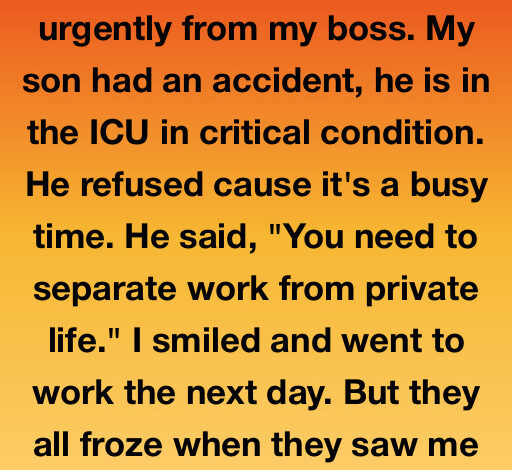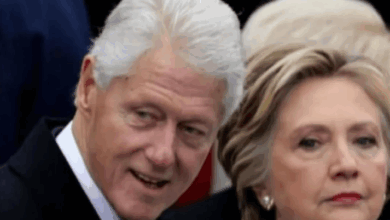
The Sandwich Mans Secret!
At work, there was this quiet guy named Paul. He always ate the same plain sandwich for lunch — no chips, no drink, no variety. Just two slices of bread and whatever he put between them. We used to joke about it behind his back, calling him “The Sandwich Man.” He never got upset. He’d just smile, nod, and go back to eating quietly at his desk.
When Paul quit one Friday afternoon, I offered to help him clear out his things. He didn’t have much — a few pens, a notebook, a small plant. But as I opened one of his drawers, I found a neat stack of children’s drawings tied with a rubber band. Crayon hearts, stick figures, and little notes: “Thank you, Mr. Paul!”
One drawing showed a man handing a sandwich to a line of smiling stick kids. Another said, “I’m not hungry today!”
I froze. Paul never talked about kids. No family photos, no calls, no mentions of children. Just work, lunch, and quiet.
Later that week, curiosity got the better of me. I asked him what those drawings were. He smiled that same calm smile and said, “You ever go by the West End Library around six in the evening? Come by sometime. You’ll see.”
A few days later, I drove there after work. I spotted Paul near the side entrance with a big cooler bag and a box of brown paper sacks. About fifteen kids — some dirty, some clearly struggling — were lined up waiting. Paul was handing out the bags, one by one, talking softly to each child.
“Evening, buddy,” he’d say, handing a boy a bag. “Tell your sister I put an extra sandwich in there today.”
It hit me like a punch.
I walked up, speechless. Paul smiled at me, the same easy office smile. “Most of them don’t get dinner,” he said quietly. “So I make sure they get at least one meal a day.”
He opened his cooler and showed me — peanut butter and jelly sandwiches, all identical. “Simple,” he said. “They like the routine. Same sandwich, same time. Something they can count on.”
That night, the image of those drawings came rushing back. I couldn’t stop thinking about how we’d made fun of him while he’d been doing this — quietly feeding hungry kids every night.
The next day, I asked if I could help. He didn’t say much, just nodded. So I started joining him after work. We’d make sandwiches in silence, wrap them up, and load them into his old cooler bag. At first, it was awkward. Then one morning, while we spread peanut butter in his tiny apartment kitchen, I asked him why he started.
He paused for a while, then said softly, “I grew up in foster care. There were nights we didn’t eat. I know what it’s like to be hungry and invisible.”
That line stayed with me. For Paul, it wasn’t charity. It was redemption. He wasn’t just feeding kids — he was feeding a part of himself that had been starving for years.
For months, this became our quiet routine. Work, sandwiches, library. Then one week, Paul didn’t show up. I called him — no answer. I waited at the library with the lunches we’d prepared, but he never came. The kids looked around, confused. One little girl tugged at my sleeve and asked, “Where’s Mr. Sandwich Man?”
A few days later, I got a call from the hospital. I was his emergency contact. He’d collapsed from exhaustion — malnutrition, dehydration, overwork. When I walked into his hospital room, he looked weak but still managed that same faint smile.
“Did you bring sandwiches?” he joked, voice barely above a whisper.
I told him I had, and that I’d taken care of his route. He grinned and squeezed my hand. “Promise me you’ll keep it going,” he said. “Just until I’m back.”
I promised.
Weeks went by. Every evening, I’d go to the library with that same cooler and hand out sandwiches. The kids started recognizing me, but they always asked about him. “When’s Mr. Paul coming back?” I told them soon.
At work, people started noticing me rushing out at the end of the day. When I finally explained what I was doing, something unexpected happened — they joined me.
Fridays became “Sandwich Fridays.” We’d take over the break room, making hundreds of sandwiches together. Someone brought in markers and stickers, and we started decorating the bags with smiley faces and little notes. One guy even designed a logo — a cartoon sandwich wearing a cape. We started putting it on every bag.
When Paul finally recovered, he didn’t return to the office. He had other plans. He used his savings to start a small nonprofit called One Meal Ahead.
He told me the name came from something his foster father once said: “You don’t need to fix your whole life at once — just stay one meal ahead of the worst day.”
He said, “That’s what I want for them. One meal ahead. One day of hope.”
I helped him file the paperwork, set up the website, and spread the word. Before long, donations started pouring in. Local bakeries gave bread. Schools hosted sandwich drives. Even some of the kids he’d once helped came back to volunteer.
One of them, a boy named Marcus, told me, “He didn’t try to save the world. He just made sure I wasn’t hungry. That was enough.”
Paul never bragged about any of it. No social media posts, no speeches, no charity galas. He didn’t want recognition. He just kept showing up — cooler in hand, wearing that same brown jacket, quietly doing what needed to be done.
I think about that a lot. How we laughed at his plain sandwiches, never realizing what they really meant. How something that looked so ordinary was actually extraordinary.
Not every hero makes headlines. Some heroes just make sandwiches.
Sometimes kindness doesn’t roar. It whispers. It shows up after work with peanut butter, jelly, and a brown paper bag.
If you ever doubt whether one small act can make a difference, think of Paul — the quiet man with a cooler full of hope, proving that changing lives doesn’t take much.
Just bread, peanut butter, and heart.




